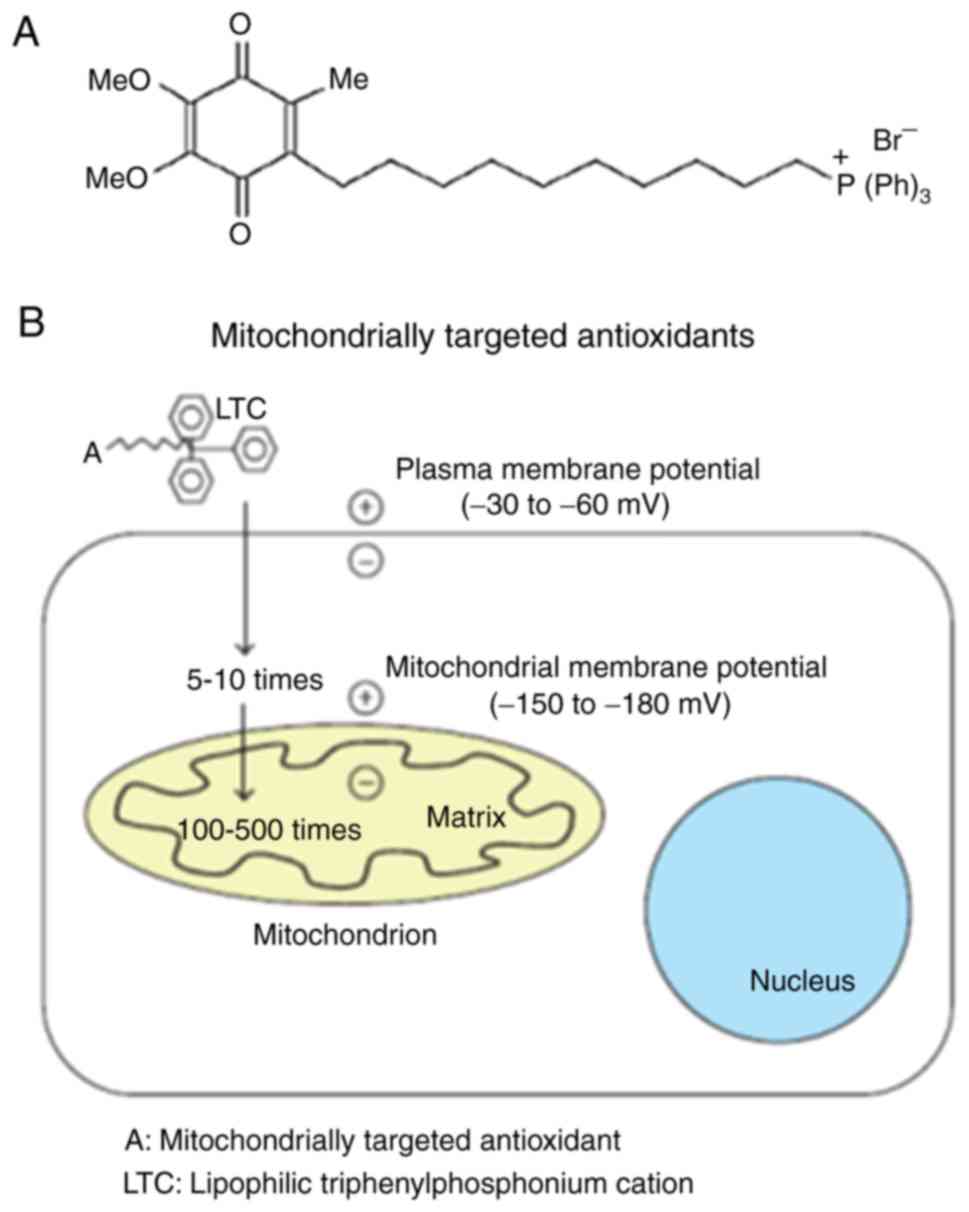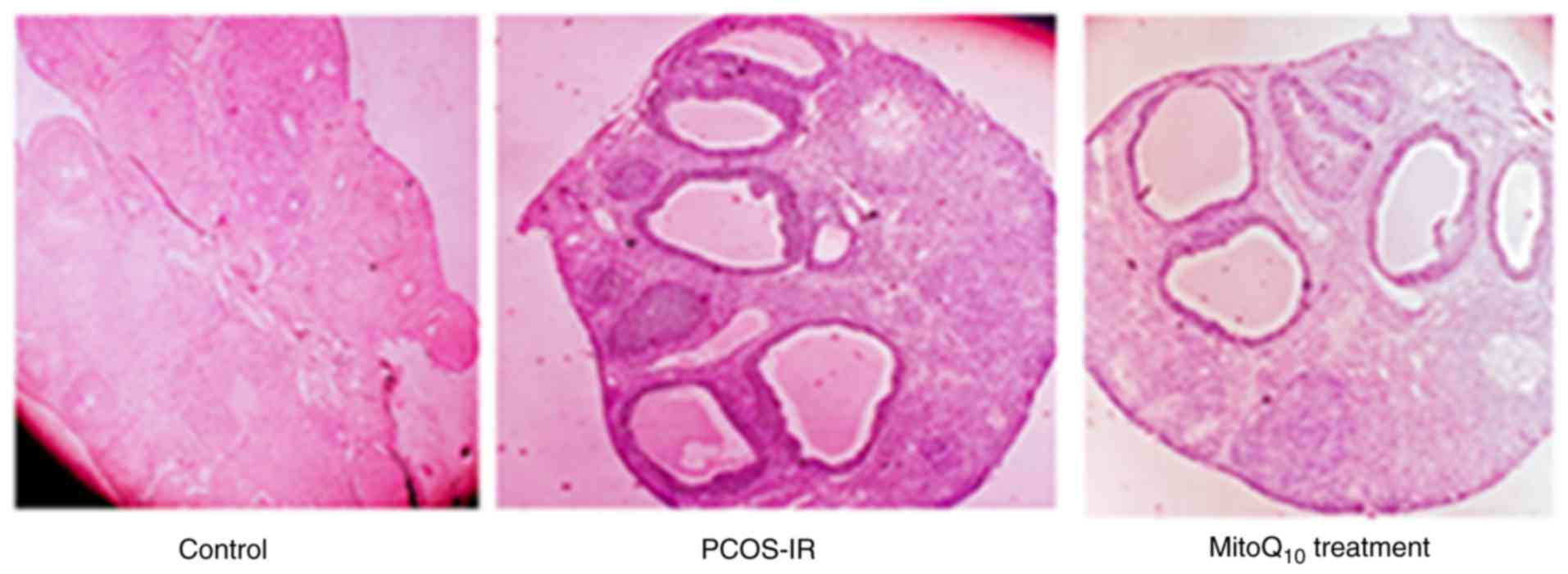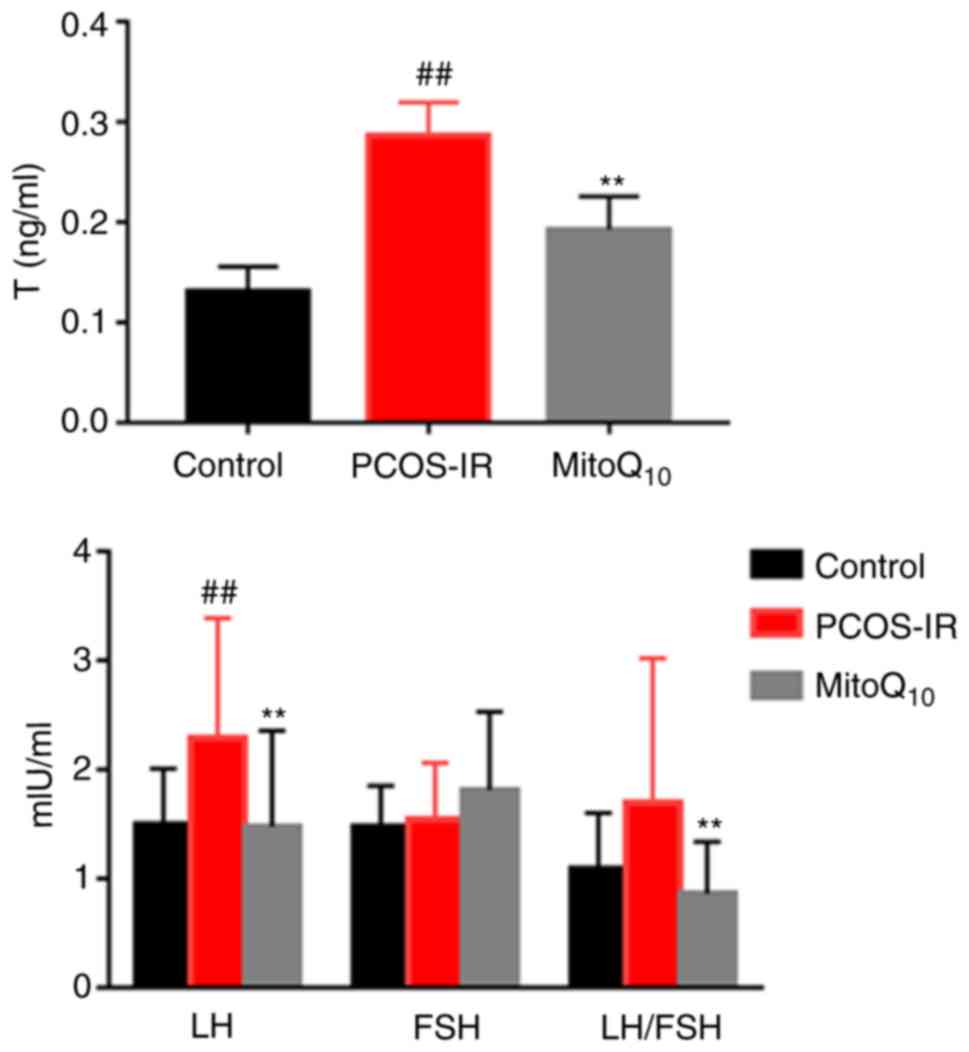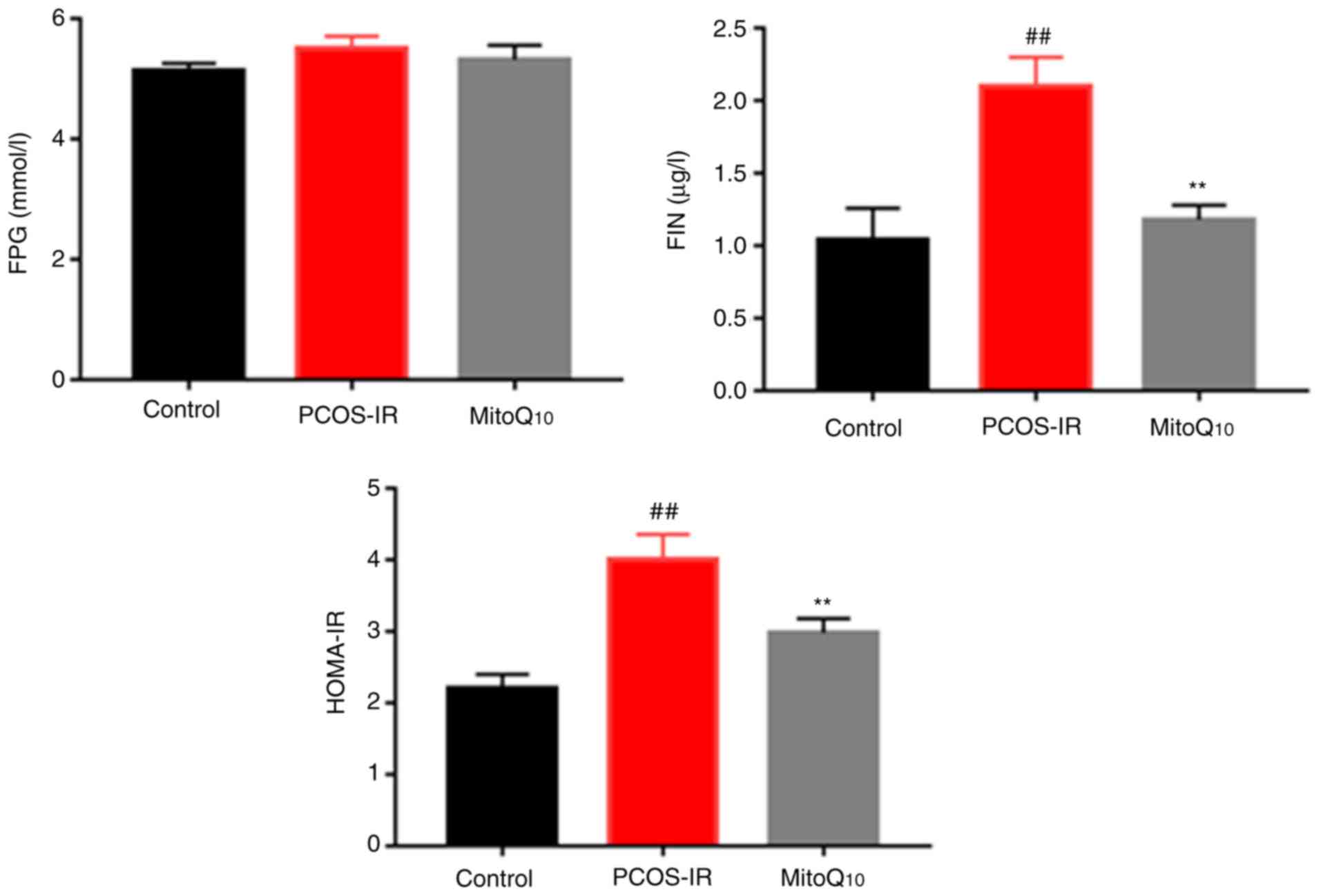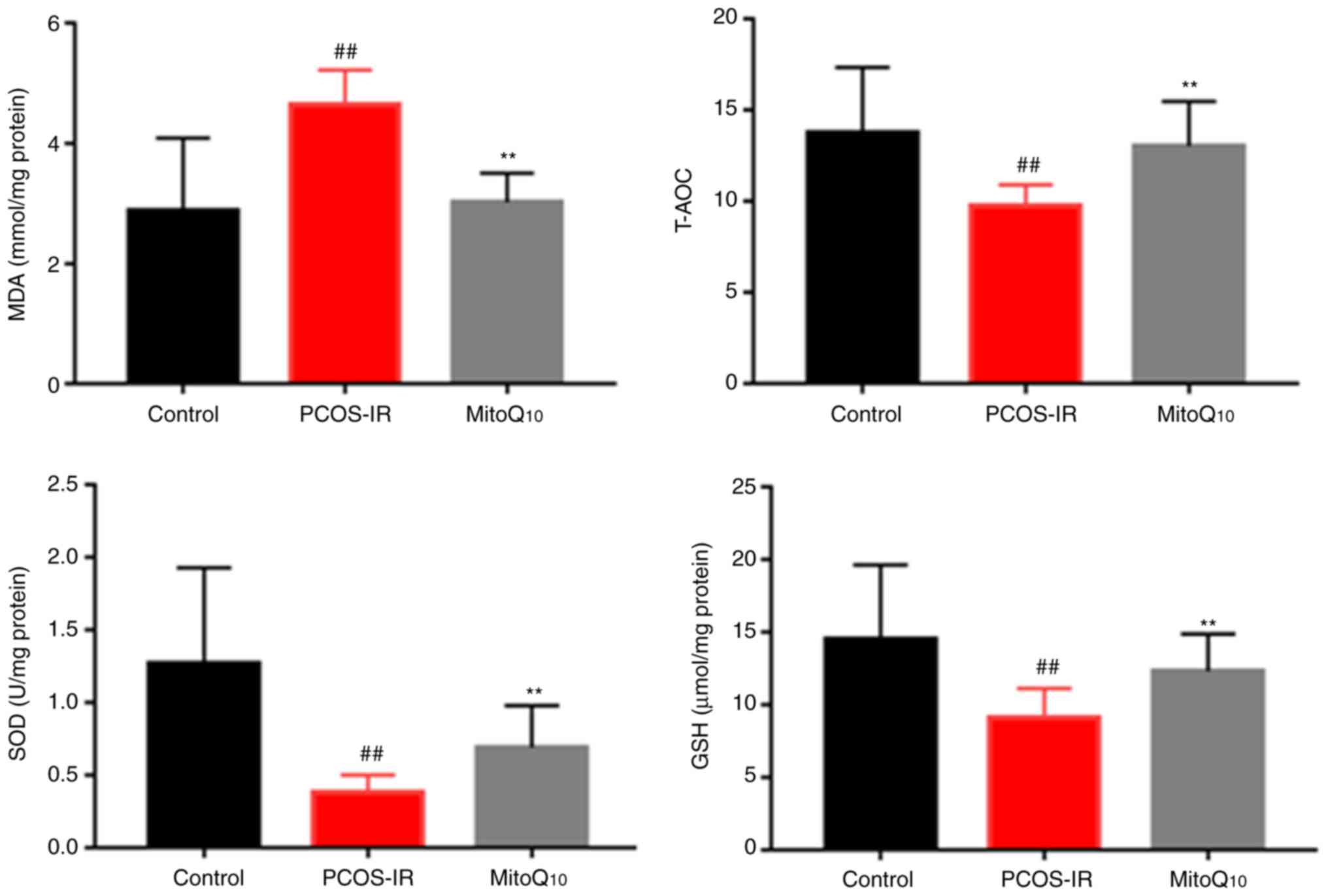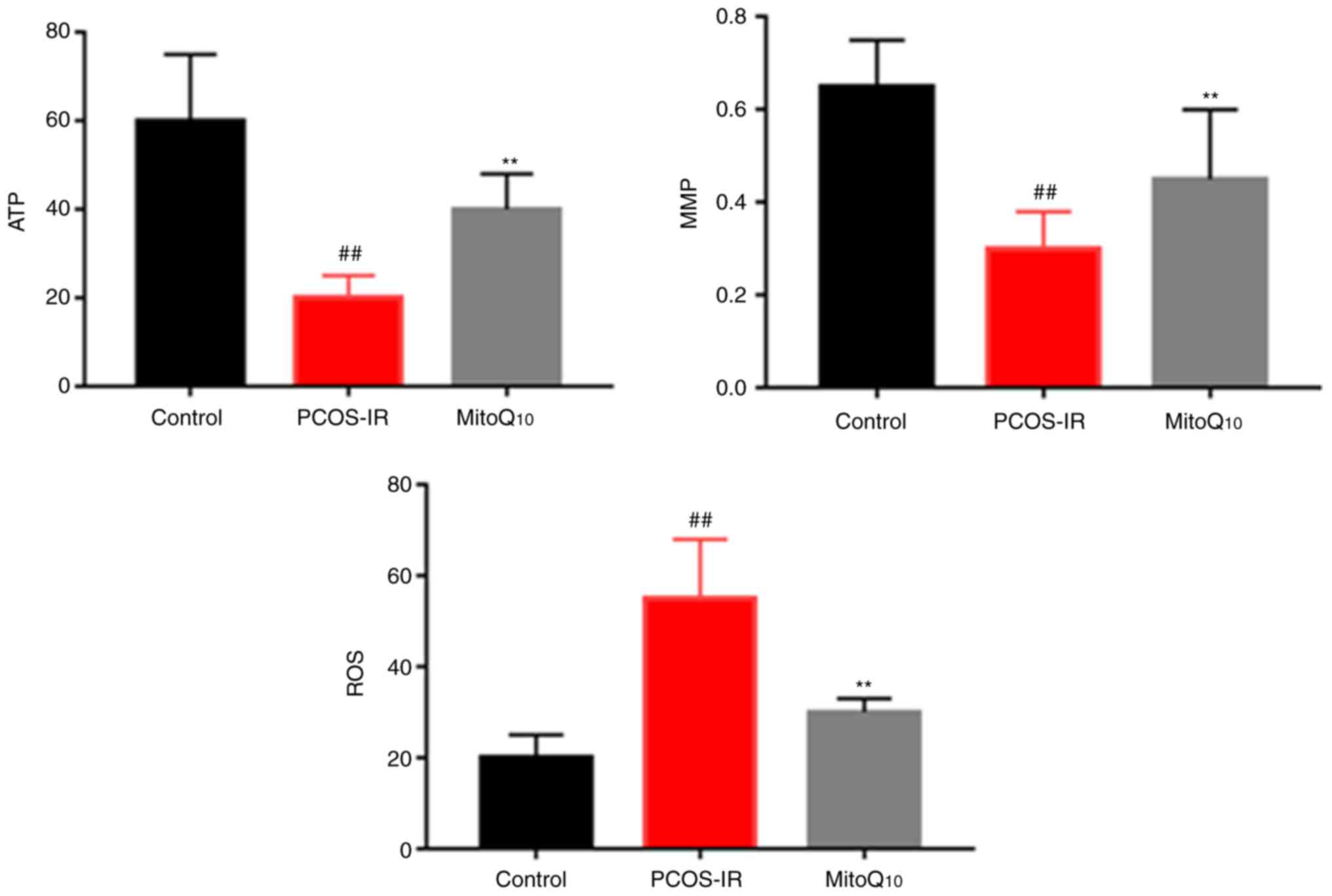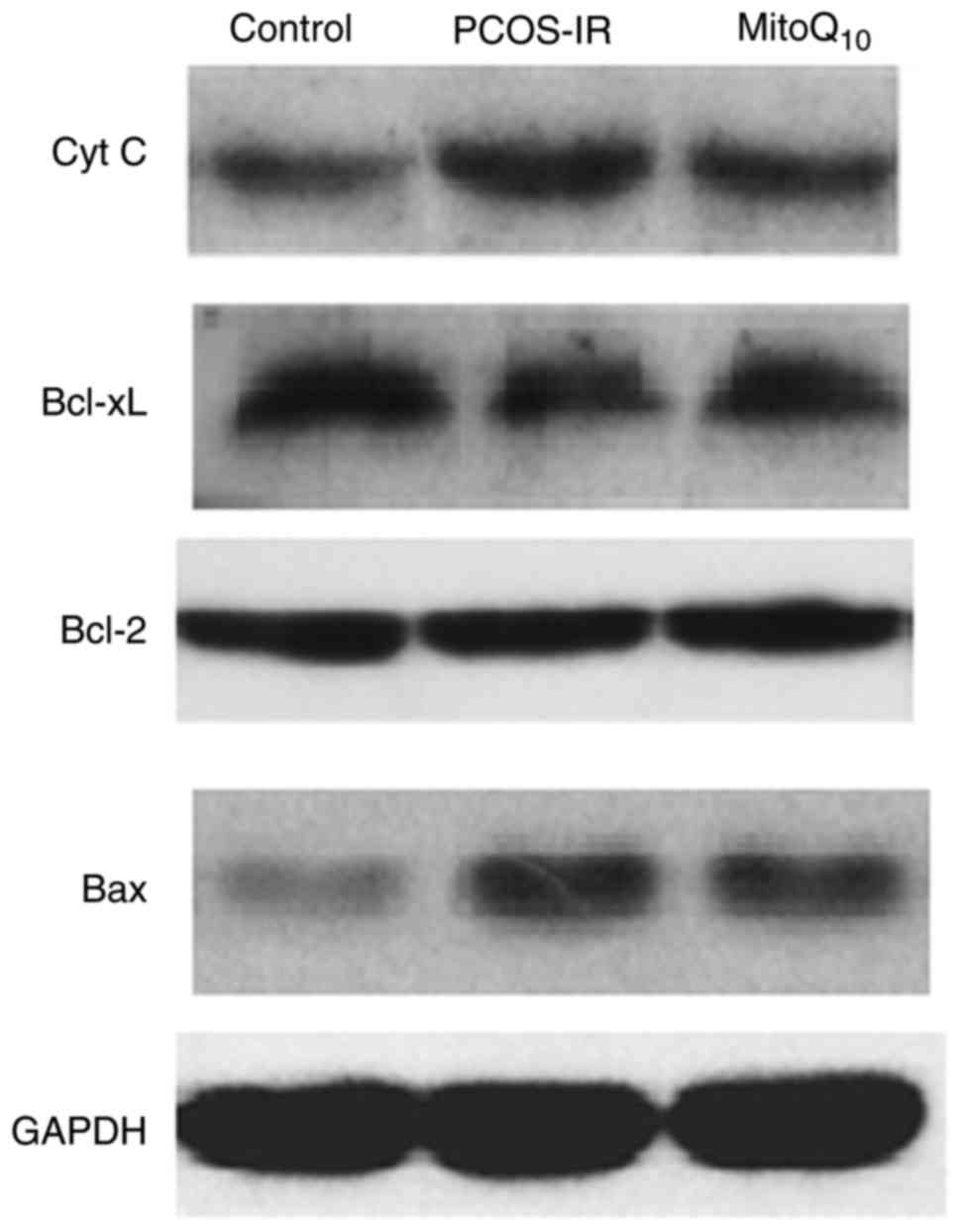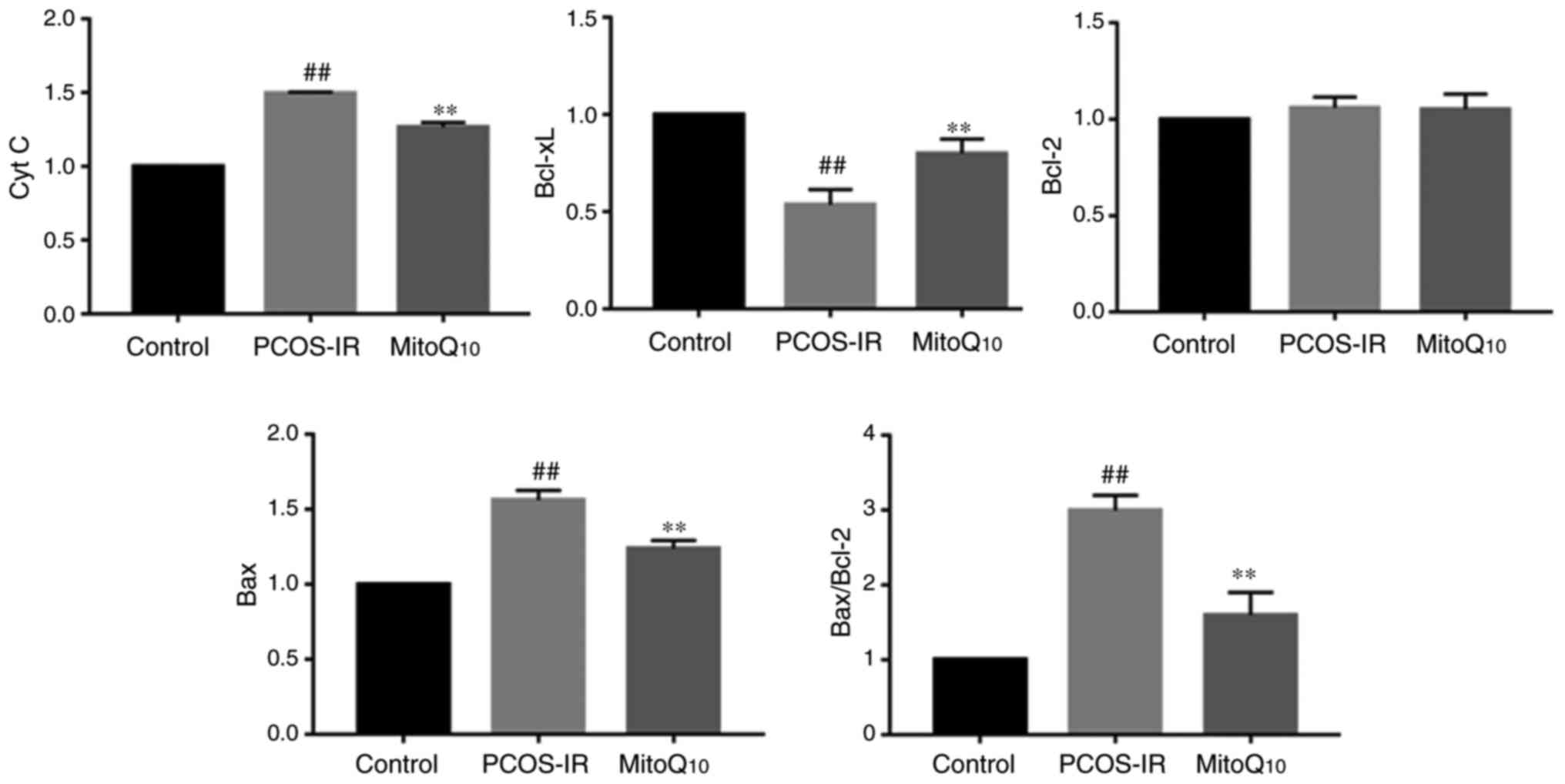|
1
|
McCartney CR and Marshall JC: Clinical
Practice. Clinical practice. Polycystic ovary syndrome. N Engl J
Med. 375:54–64. 2016. View Article : Google Scholar : PubMed/NCBI
|
|
2
|
Ali AT: Polycystic ovary syndrome and
metabolic syndrome. Ceska Gynekol. 80:279–289. 2015.PubMed/NCBI
|
|
3
|
Kalyanaraman B: Teaching the basics of
redox biology to medical and graduate students: Oxidants,
antioxidants and disease mechanisms. Redox Biol. 1:244–257. 2013.
View Article : Google Scholar : PubMed/NCBI
|
|
4
|
Liu X, Zhu Q, Zhang M, Yin T, Xu R, Xiao
W, Wu J, Deng B, Gao X, Gong W, et al: Isoliquiritigenin
ameliorates acute pancreatitis in mice via inhibition of oxidative
stress and modulation of the Nrf2/HO-1 pathway. Oxid Med Cell
Longev. 2018.7161592:2018.
|
|
5
|
Dalle-Donne I, Rossi R, Colombo R,
Giustarini D and Milzani A: Biomarkers of oxidative damage in human
disease. Clin Chem. 52:601–623. 2006. View Article : Google Scholar : PubMed/NCBI
|
|
6
|
Escobar-Morreale HF, Luque-Ramírez M and
San Millán JL: The molecular-genetic basis of functional
hyperandrogenism and the polycystic ovary syndrome. Endocr Rev.
26:251–282. 2005. View Article : Google Scholar
|
|
7
|
Zuo T, Zhu M and Xu W: Roles of oxidative
stress in polycystic ovary syndrome and cancers. Oxid Med Cell
Longev. 2016.8589318:2016.
|
|
8
|
Picard M, Wallace DC and Burelle Y: The
rise of mitochondria in medicine. Mitochondrion. 30:105–116. 2016.
View Article : Google Scholar : PubMed/NCBI
|
|
9
|
Böttger EC and Schacht J: The
mitochondrion: A perpetrator of acquired hearing loss. Hear Res.
303:12–19. 2013. View Article : Google Scholar : PubMed/NCBI
|
|
10
|
Ding Y, Xia BH, Zhang CJ and Zhuo GC:
Mitochondrial tRNALeu(UUR) C3275T, tRNAGln T4363C and tRNALys
A8343G mutations may be associated with PCOS and metabolic
syndrome. Gene. 642:299–306. 2018. View Article : Google Scholar
|
|
11
|
Ding Y, Xia BH, Zhang CJ and Zhuo GC:
Mutations in mitochondrial tRNA genes may be related to insulin
resistance in women with polycystic ovary syndrome. Am J Transl
Res. 9:2984–2996. 2017.PubMed/NCBI
|
|
12
|
Kelso GF, Porteous CM, Coulter CV, Hughes
G, Porteous WK, Ledgerwood EC, Smith RA and Murphy MP: Selective
targeting of a redox-active ubiquinone to mitochondria within
cells: antioxidant and antiapoptotic properties. J Biol Chem.
276:4588–4596. 2001. View Article : Google Scholar
|
|
13
|
Smith RA and Murphy MP: Animal and human
studies with the mitochondria-targeted antioxidant MitoQ. Ann NY
Acad Sci. 1201:96–103. 2010. View Article : Google Scholar : PubMed/NCBI
|
|
14
|
Manczak M, Mao P, Calkins MJ, Cornea A,
Reddy AP, Murphy MP, Szeto HH, Park B and Reddy PH:
Mitochondria-targeted antioxidants protect against amyloid-beta
toxicity in Alzheimer’s disease neurons. J Alzheimers Dis. 20(Suppl
2): S609–S631. 2010. View Article : Google Scholar
|
|
15
|
Mao P, Manczak M, Shirendeb UP and Reddy
PH: MitoQ, a mitochondria-targeted antioxidant, delays disease
progression and alleviates pathogenesis in an experimental
autoimmune encephalomyelitis mouse model of multiple sclerosis.
Biochim Biophys Acta. 1832.2322–2331. 2013.
|
|
16
|
Graham D, Huynh NN, Hamilton CA, Beattie
E, Smith RA, Cochemé HM, Murphy MP and Dominiczak AF:
Mitochondria-targeted antioxidant MitoQ10 improves endothelial
function and attenuates cardiac hypertrophy. Hypertension.
54:322–328. 2009. View Article : Google Scholar : PubMed/NCBI
|
|
17
|
McLachlan J, Beattie E, Murphy MP, Koh-Tan
CH, Olson E, Beattie W, Dominiczak AF, Nicklin SA and Graham D:
Combined therapeutic benefit of mitochondria-targeted antioxidant,
MitoQ10, and angiotensin receptor blocker, losartan, on
cardiovascular function. J Hypertens. 32:555–564. 2014. View Article : Google Scholar :
|
|
18
|
Keskin M, Kurtoglu S, Kendirci M, Atabek
ME and Yazici C: Homeostasis model assessment is more reliable than
the fasting glucose/insulin ratio and quantitative insulin
sensitivity check index for assessing insulin resistance among
obese children and adolescents. Pediatrics. 115:e500–e503. 2005.
View Article : Google Scholar : PubMed/NCBI
|
|
19
|
Yarian CS, Toroser D and Sohal RS:
Aconitase is the main functional target of aging in the citric acid
cycle of kidney mitochondria from mice. Mech Ageing Dev. 127:79–84.
2006. View Article : Google Scholar
|
|
20
|
Yuan Y, Chen Y, Zhang P, Huang S, Zhu C,
Ding G, Liu B, Yang T and Zhang A: Mitochondrial dysfunction
accounts for aldosterone-induced epithelial-to-mesenchymal
transition of renal proximal tubular epithelial cells. Free Radic
Biol Med. 53:30–43. 2012. View Article : Google Scholar : PubMed/NCBI
|
|
21
|
Raza H, John A and Howarth FC: Increased
oxidative stress and mitochondrial dysfunction in zucker diabetic
rat liver and brain. Cell Physiol Biochem. 35:1241–1251. 2015.
View Article : Google Scholar : PubMed/NCBI
|
|
22
|
Dignam JD, Lebovitz RM and Roeder RG:
Accurate transcription initiation by RNA polymerase II in a soluble
extract from isolated mammalian nuclei. Nucleic Acids Res.
11:1475–1489. 1983. View Article : Google Scholar : PubMed/NCBI
|
|
23
|
Victor VM, Rovira-Llopis S, Bañuls C,
Diaz-Morales N, Martinez de Marañon A, Rios-Navarro C, Alvarez A,
Gomez M, Rocha M and Hernández-Mijares A: Insulin resistance in
PCOS patients enhances oxidative stress and leukocyte adhesion:
Role of myeloperoxidase. PLoS One. 11:e015–1960. 2016. View Article : Google Scholar
|
|
24
|
Serrano Mujica L, Bridi A, Della Méa R,
Rissi VB, Guarda N, Moresco RN, Premaor MO, Antoniazzi AQ,
Gonçalves PBD and Comim FV: Oxidative stress and metabolic markers
in pre- and postnatal polycystic ovary syndrome rat protocols. J
Inflamm Res. 11:193–202. 2018. View Article : Google Scholar : PubMed/NCBI
|
|
25
|
Ross MF, Kelso GF, Blaikie FH, James AM,
Cochemé HM, Filipovska A, Da Ros T, Hurd TR, Smith RA and Murphy
MP: Lipophilic triphenylphosphonium cations as tools in
mitochondrial bioenergetics and free radical biology. Biochemistry
(Mosc). 70:222–230. 2005. View Article : Google Scholar
|
|
26
|
Firsov AM, Kotova EA, Orlov VN, Antonenko
YN and Skulachev VP: A mitochondria-targeted antioxidant can
inhibit peroxidase activity of cytochrome c by detachment of the
protein from liposomes. FEBS Lett. 590:2836–2843. 2016. View Article : Google Scholar : PubMed/NCBI
|
|
27
|
James AM, Cochemé HM and Murphy MP:
Mitochondria-targeted redox probes as tools in the study of
oxidative damage and ageing. Mech Ageing Dev. 126:982–986. 2005.
View Article : Google Scholar : PubMed/NCBI
|
|
28
|
Yilmaz N, Inal HA, Gorkem U, Sargin Oruc
A, Yilmaz S and Turkkani A: Follicular fluid total antioxidant
capacity levels in PCOS. J Obstet Gynaecol. 36:654–657. 2016.
View Article : Google Scholar : PubMed/NCBI
|
|
29
|
Abu Bakar MH, Sarmidi MR, Tan JS and
Mohamad Rosdi MN: Celastrol attenuates mitochondrial dysfunction
and inflammation in palmitate-mediated insulin resistance in C3A
hepatocytes. Eur J Pharmacol. 799:73–83. 2017. View Article : Google Scholar : PubMed/NCBI
|
|
30
|
Hafizi Abu Bakar M, Kian Kai C, Wan Hassan
WN, Sarmidi MR, Yaakob H and Zaman Huri H: Mitochondrial
dysfunction as a central event for mechanisms underlying insulin
resistance: The roles of long chain fatty acids. Diabetes Metab Res
Rev. 31:453–475. 2015. View Article : Google Scholar
|
|
31
|
Yan Y, Su X, Liang Y, Zhang J, Shi C, Lu
Y, Gu L and Fu L: Emodin azide methyl anthraquinone derivative
triggers mitochondrial-dependent cell apoptosis involving in
caspase-8-mediated Bid cleavage. Mol Cancer Ther. 7:1688–1697.
2008. View Article : Google Scholar : PubMed/NCBI
|
|
32
|
Wang XH, Jia DZ, Liang YJ, Yan SL, Ding Y,
Chen LM, Shi Z, Zeng MS, Liu GF and Fu LW: Lgf-YL-9 induces
apoptosis in human epidermoid carcinoma KB cells and multidrug
resistant KBv200 cells via reactive oxygen species-independent
mitochondrial pathway. Cancer Lett. 249:256–270. 2007. View Article : Google Scholar
|
|
33
|
Kluck RM, Bossy-Wetzel E, Green DR and
Newmeyer DD: The release of cytochrome c from mitochondria: a
primary site for Bcl-2 regulation of apoptosis. Science.
275:1132–1136. 1997. View Article : Google Scholar : PubMed/NCBI
|
|
34
|
Yang J, Liu X, Bhalla K, Kim CN, Ibrado
AM, Cai J, Peng TI, Jones DP and Wang X: Prevention of apoptosis by
Bcl-2: Release of cytochrome c from mitochondria blocked. Science.
275:1129–1132. 1997. View Article : Google Scholar : PubMed/NCBI
|
|
35
|
Nechushtan A, Smith CL, Lamensdorf I, Yoon
SH and Youle RJ: Bax and Bak coalesce into novel
mitochondria-associated clusters during apoptosis. J Cell Biol.
153:1265–1276. 2001. View Article : Google Scholar : PubMed/NCBI
|
|
36
|
Susin SA, Lorenzo HK, Zamzami N, Marzo I,
Snow BE, Brothers GM, Mangion J, Jacotot E, Costantini P, Loeffler
M, et al: Molecular characterization of mitochondrial
apoptosis-inducing factor. Nature. 397:441–446. 1999. View Article : Google Scholar : PubMed/NCBI
|
|
37
|
Zhang JY, Yi T, Liu J, Zhao ZZ and Chen
HB: Quercetin induces apoptosis via the mitochondrial pathway in KB
and KBv200 cells. J Agric Food Chem. 61:2188–2195. 2013. View Article : Google Scholar : PubMed/NCBI
|
|
38
|
Westphal D, Dewson G, Czabotar PE and
Kluck RM: Molecular biology of Bax and Bak activation and action.
Biochim Biophys Acta. 1813.521–531. 2011.
|
|
39
|
Hampton MB and Orrenius S: Dual regulation
of caspase activity by hydrogen peroxide: Implications for
apoptosis. FEBS Lett. 414:552–556. 1997. View Article : Google Scholar : PubMed/NCBI
|
|
40
|
Eleftheriadis T, Pissas G, Liakopoulos V
and Stefanidis I: Cytochrome c as a potentially clinical useful
marker of mitochondrial and cellular damage. Front Immunol.
7:2792016. View Article : Google Scholar : PubMed/NCBI
|
|
41
|
Li H, Huang Y, Chen C, Xiao A, Hou G,
Huang Y, Feng X and Guan BO: Real-time cellular cytochrome c
monitoring through an optical microfiber: Enabled by a
silver-decorated graphene nanointerface. Adv Sci (Weinh).
5:17010742018. View Article : Google Scholar
|
|
42
|
Radhakrishnan J, Origenes R, Littlejohn G,
Nikolich S, Choi E, Smite S, Lamoureux L, Baetiong A, Shah M and
Gazmuri RJ: Plasma cytochrome c detection using a highly sensitive
electrochemiluminescence enzyme-linked immunosorbent assay. Biomark
Insights. 12:11772719177469722017. View Article : Google Scholar : PubMed/NCBI
|















